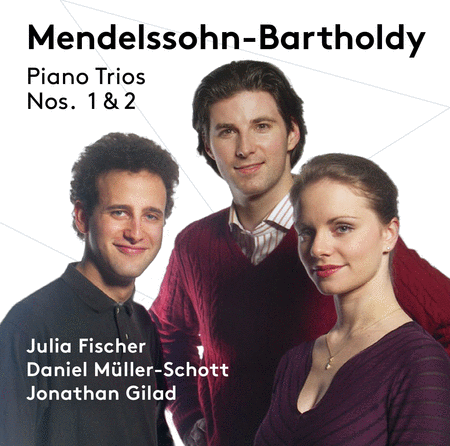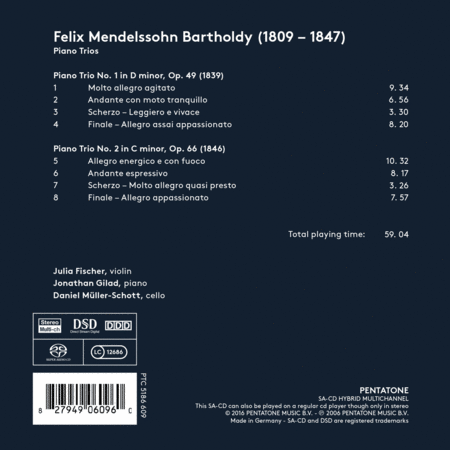Felix Mendelssohn Bartholdy: The Piano Trios, Nos. 1 & 2
Details
Description
SKU: NX.PTC5186609
By Daniel Muller-Schott, Jonathan Gilad, and Julia Fischer. By Felix Bartholdy Mendelssohn. Country of Origin: Germany. Classical. Hybrid super audio listening CD. Published by Pentatone Music (NX.PTC5186609).827949060960.
There are few composers who simultaneously exemplify both restraint and innovation as well as Felix Mendelssohn-Bartholdy. Heavily inspired by both the Classical and Romantic traditions, Mendelssohn saw his life's purpose as being to "continue working on the legacy left to me by the great masters...the works hould also carry on from where it left off in accordance with one's creative powers, and not be solely an unimaginative repetition of what has been." Mendelssohn's two piano trios provide some of the finest examples of the balance he was able to achieve between deference to the great masters, in this case Ludwig van Beethoven, and a more romantic sensibility for chromaticism, harmony and orchestration. A noted pianist in his own right, Mendelssohn performed the piano part on the premieres of both trios, along with Ferdinand David on violin and Carl Wittmann on cello. The contrast between the two piano works is striking. The Piano Trio in D minor was written in 1839, during the artistic and personal zenith of Mendelssohn's career. After years of remarkable success all over Europe, his appointment as director of the Leipzig Gewandhaus concerts in 1835 ensured that he could finally begin to settle down in Germany, secure in his financial prospects. Two years later, Mendelssohn married and appeared to relish his new life as a husband and father of five. The first piano trio clearly reflects this elated mood, with lively dance movements and joyful, lyrical themes that this release manages to capture perfectly. In contrast to the Piano Trio in C minor, written only five years later, reflects a much more tumultuous period in Mendelssohn's life. His mother had died in 1843 and his health was beginning to turn for the worse, culminating in a fatal stroke on November 4th, 1847. Musically, this contributed to a period of dark timbres, tense tempos and increased chromaticism. Even during this gloomy time the tone is more understated than melodramatic, tending towards a more subtle form of subversion which is even more difficult to pull off, and all the more enjoyable when performed as convincingly as it is by the artists here.
About Listening CDs
Listening CDs are traditional music recordings. Listening CDs make a great educational supplement - hear exceptional professionals play the music you're learning! Or, just enjoy listening to the music you love.


 Share
Share